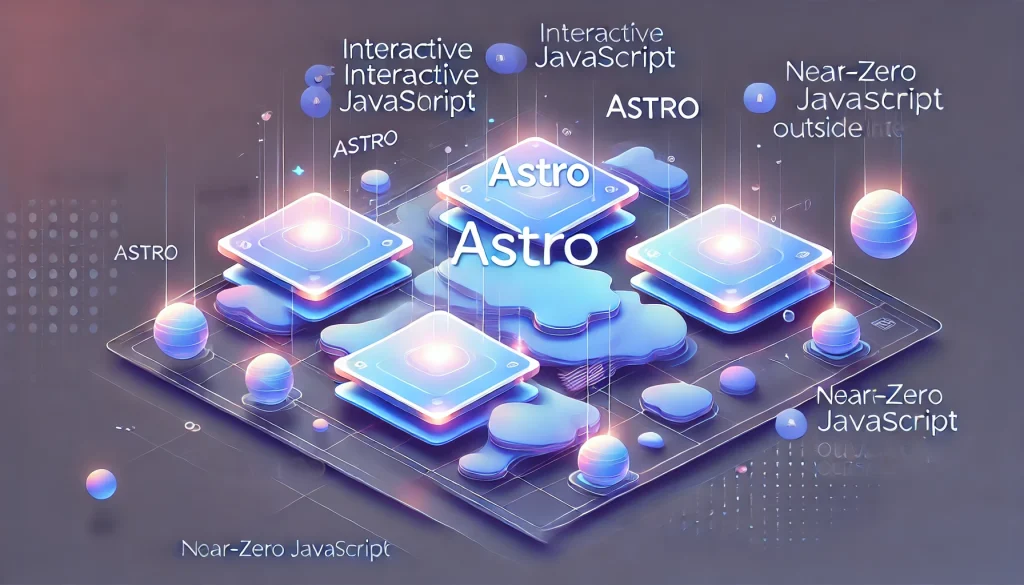In the world of front-end development, React and Angular have long dominated. Yet a new wave of lightweight frameworks – Svelte, Qwik, and Astro – is emerging to challenge the status quo. These tools prioritize performance, minimal JavaScript overhead, and an overall simpler developer experience. As modern web apps grow more complex, developers are increasingly seeking solutions that tackle performance bottlenecks and reduce build-time overhead.
In this article, we’ll explore why Svelte, Qwik, and Astro stand out, and how they might redefine “best practices” for front-end development.
1. Svelte: Compiling Away the Framework
1.1 The Key Idea
Svelte is often described as “the framework with no framework” at runtime. Unlike React or Angular, which ship a virtual DOM and re-render logic to the client, Svelte compiles components at build time. As a result, your final bundle includes mostly pure JavaScript for your application logic, not an entire framework runtime.

What this means:
- Smaller Bundle Size: By removing the overhead of a client-side runtime, Svelte apps often load faster.
- Better Performance: With less DOM manipulation overhead, Svelte can be quite efficient in dynamic UIs.
- Simplified Syntax: Svelte’s single-file components (
.sveltefiles) make it easy to see markup, styles, and logic in one place.
1.2 Why Developers Love Svelte
Surveys indicate about 25% of frontend developers already use Svelte, and 44% more are interested in learning it. This surge in popularity reflects a desire to move away from large frameworks and adopt a more direct approach to building web apps. Svelte’s simplicity resonates especially with teams that need better performance and smoother developer workflows.
1.3 Use Cases
- Interactive Dashboards: Svelte’s minimal overhead speeds up data-heavy interfaces.
- Small to Medium Projects: For simpler apps or prototypes, the swift compile-time feedback helps maintain a lean codebase.
- High-Performance Sites: Where every kilobyte matters, and SSR (Server-Side Rendering) can yield even faster loads.
2. Qwik: Focusing on Fast Initial Loads

2.1 The Qwik Approach
Qwik is a relatively new framework designed to tackle the initial load problem. Traditional single-page applications (SPAs) often ship large bundles of JavaScript, forcing users to wait until the JS parses before seeing anything interactive. Qwik tries to lazy-load almost everything, shipping minimal JavaScript for the initial render, then gradually loading more as needed.
Highlights:
- Resumability: Qwik can serialize component states on the server, allowing the client to instantly “resume” with minimal overhead.
- Component-Level Lazy Loading: Each component can be hydrated only when it’s interacted with, drastically cutting down initial JS.
2.2 Qwik’s Impact on Performance
This approach can transform how developers build pages:
- Lightning-Fast First Paint: Less JavaScript means faster Time-to-Interactive.
- Less Idle Scripts: Unused code stays off the client side until absolutely necessary.
- SEO & SSR Friendly: Like many modern frameworks, Qwik has strong SSR capabilities for improved search engine visibility.
2.3 Potential Downsides
Since Qwik is still relatively fresh, the ecosystem and tooling might be less mature than in older frameworks. Larger or more complex applications may also require advanced patterns for truly modular code splitting. Nevertheless, for devs passionate about pushing performance boundaries, Qwik offers a unique solution.
3. Astro: Lightweight and Content-Focused

3.1 Astro’s Unique Philosophy
Astro brands itself as the framework for building content-focused websites, specifically emphasizing minimal JavaScript shipping. By default, Astro sends almost zero JS to the client, unless you opt to hydrate interactive components. This can make static content or blog pages extremely fast to load, reducing bounce rates and improving user experience.
3.2 Islands Architecture
Astro popularized an “islands architecture,” where interactive components (islands of JS) sit within an otherwise static page. Each island is independently hydrated on the client, ensuring that only relevant JavaScript runs, while the rest of the page remains static HTML.
Key advantages:
- Performance: Minimal JS for purely static sections.
- Flexibility: You can embed React, Svelte, Vue, or other frameworks as islands.
- Great for Content Sites: Blogs, marketing sites, and docs pages see better SEO and time-to-first-byte performance with Astro.
3.3 Where Astro Shines
- Static & Content-Heavy Sites: If your project is mostly static with some sprinkles of interactivity, Astro’s approach can drastically reduce overhead.
- Mixing Frameworks: Astro’s support for multiple frameworks simultaneously helps teams unify codebases or migrate incrementally.
- Server-Side Rendering: Built-in SSR supports dynamic data fetching if needed, balancing static and dynamic features.
4. Redefining “Best Practices” for Front-End
4.1 Performance-First Mindset
React and Angular revolutionized how we built large SPAs, but they come with overhead that can hamper initial load performance. By focusing on smaller bundles, faster rendering, and partial hydration, Svelte, Qwik, and Astro push a performance-first approach that resonates with modern user expectations—especially on mobile devices and lower-end hardware.
4.2 Simpler Developer Experience
Another hallmark of these new frameworks is streamlined syntax or easy defaults:
- Svelte compiles away complexity at build time, letting you focus on the essence of your components.
- Qwik automatically handles partial hydration, saving developers from manually optimizing code splits.
- Astro allows a flexible mix of frameworks while ensuring minimal baseline overhead.
In many cases, these frameworks reduce the ceremony or learning curve associated with older solutions, potentially lowering entry barriers for new devs.
4.3 Ecosystem Maturity
Despite their benefits, each framework is relatively younger than React or Angular. Ecosystem maturity, library availability, and wide community support can differ. Teams must assess whether these frameworks cover all their use cases:
- UI Libraries & Components: Are there pre-built components or third-party integrations?
- Tooling & Plugins: Does the framework integrate well with your DevOps pipeline, testing frameworks, etc.?
- Documentation & Community: Smaller ecosystems may mean fewer tutorials and fewer experts to hire.
However, the rapid growth in interest indicates that community ecosystems for these frameworks continue to expand, bridging any early gaps in maturity.
5. Getting Started
- Try a Simple Project
Spin up a small personal site or internal tool using Svelte, Qwik, or Astro. Evaluate how they handle your typical workflows. - Benchmark Performance
Compare the initial page load and runtime performance with your existing React or Angular solutions. See if the difference justifies a potential migration. - Explore Ecosystem Tools
Check out official docs, community plugins, and SSR integrations. You might find handy solutions for routing, state management, or data fetching that align with your use case. - Engage with Community
Join the frameworks’ Discord servers or Slack channels. Active engagement helps you discover best practices, plus you can give feedback to shape the frameworks’ roadmaps.
Conclusion
Svelte, Qwik, and Astro each represent a lighter, faster approach to web development, seeking to minimize JavaScript overhead and improve user experience from the get-go. Whether you’re after Svelte’s simplicity, Qwik’s modular hydration, or Astro’s near-zero JS approach for static content, these frameworks highlight a performance revolution in front-end development.
Key Takeaways:
- Svelte: Compiles away runtime overhead, focusing on direct, efficient code.
- Qwik: Minimizes initial load with partial hydration, letting components “wake up” only as needed.
- Astro: Delivers near-zero JavaScript for static sections, focusing on content and selectively hydrating interactive “islands.”
Although React and Angular remain powerful for large-scale apps, this next generation of frameworks challenges devs to rethink typical design patterns, potentially redefining best practices for building lean, user-friendly web experiences. If performance and simplicity matter to you, it’s worth giving these new contenders a try.












